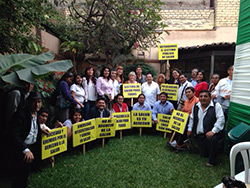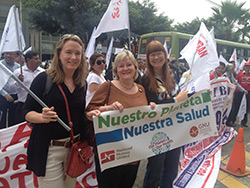Blog
"If the energy source requires a smoke stack, then it isn't clean."
Scenes from the Climate Change Summit in Peru
LIMA, Peru - During the UN Climate Change Summit, we’ve been meeting regularly with other activists from the Trade Unions for Energy Democracy, the International Transportation Union and the Peruvian Federation of Nurses.
By our presence and our action, we are trying to demonstrate that nurses care, and that National Nurses United will support other unions trying to do the right thing in transitioning away from combustion sources of energy and supporting "just transition" principles to help make that transition easier. We also are working to make sure that concerns over the public health impacts of pollution (cancer, asthma, pulmonary disease, etc) and changing climate patterns (hunger, disease) are addressed in discussions around potential courses of action to combat further dumping of carbon into the atmosphere.
As our statement makes clear:
NNU emphasizes the health impacts of climate disruption. Already, more than 8 million deaths worldwide are directly attributable to air pollution, primarily due to the use of "combustion energy" derived from the burning of oil, gas, coal, biomass, and waste, and lack of access to clean energy. Warming temperatures have accelerated the spread of vector-born diseases such as Ebola, malaria, dengue, yellow fever, and Lymes disease that spike as temperatures increase.
If the energy source requires a smoke stack then it isn't clean. If it emits toxic substances that affect those unlucky enough to live downwind or downstream then it isn't just. If it adds carbon to the atmosphere then it is part of the problem in the emerging global climate crisis.

